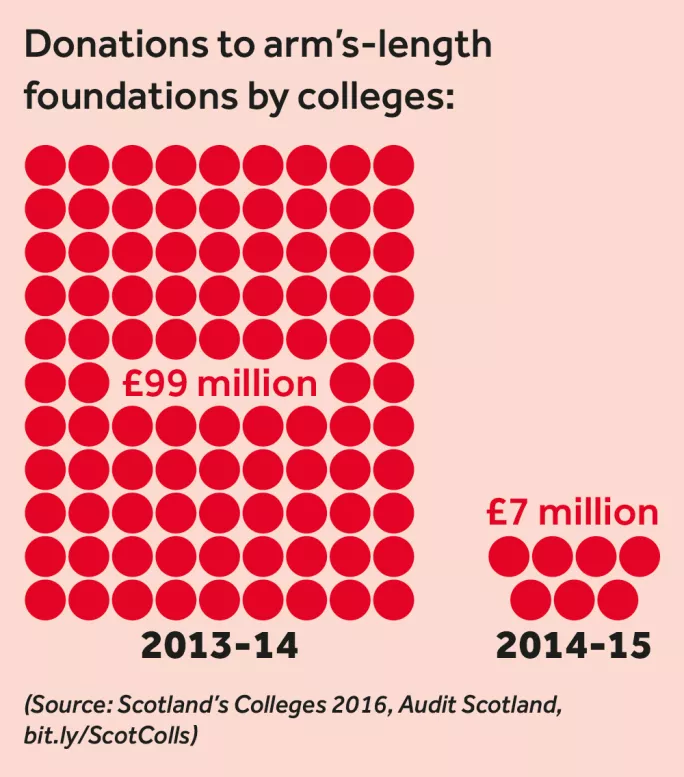Colleges’ ‘pots of gold’ get smaller

Colleges paid nothing into the arm’s-length foundations set up to hold their surpluses, amid a sector-wide financial squeeze, Colleges Scotland has warned
Figures seen by Tes Scotland also show that the level of funding held in the foundation set up by the Scottish Funding Council to protect colleges’ reserves has dropped by more than 60 per cent over two years.
Unions have branded arm’s-length foundations (ALFs) “secret pots of gold” used by managers to stash away millions of pounds - and some are understood to still hold funds exceeding six figures.
But the latest figures suggest that colleges are increasingly struggling to build up the surpluses that in recent years have been needed for capital projects, such as new buildings.
ALFs were set up after colleges were reclassified as public bodies by the Office for National Statistics in April 2014, which meant they could no longer hold reserves beyond the end of a financial year, and would instead have to return any surpluses to the government.
To protect the funds - often built up over a number of years and earmarked for particular projects, such as new buildings and equipment - an umbrella ALF was set up by the Scottish Funding Council. Many colleges also set up their own foundations.
While accounts for the umbrella fund show that it held £25.3 million on 31 March 2014, that amount dropped to £17.4 million the following year, before falling sharply to £8 million in 2016. Currently, five colleges use the fund.

Shona Struthers, chief executive of Colleges Scotland, told Tes Scotland: “No funds have been transferred into ALFs [for this financial year].”
The reason, she said, was that colleges made no surplus, owing to the financial climate. Colleges have faced a severe funding squeeze in recent years: Tes Scotland revealed last month that more than three-quarters of Scotland’s colleges reported an overall deficit for 2015-16.
Colleges can pay into the foundations, as can other organisations, but because the ALFs are fully independent from colleges and are charitable organisations with independent trustees, colleges have to put forward a case to draw money from them, outlining the specific reason.
Overall, colleges transferred only £7 million to ALFs in 2014-15, down from £99 million in 2013-14, according to a 2016 Audit Scotland report. The report also showed that colleges received £23 million of funding for capital projects from ALFs in 2014-15. It forecast that more than £59 million of capital expenditure would be funded from ALFs over the four years to 2018-19.
John Gallacher, Scottish organiser for FE at the support staff union Unison, said any remaining reserves should be “returned to within the public books of the public bodies which are further education colleges in Scotland; utilised for normal capital and revenue expenditure plans of the boards, and covered by the normal governance and accounting rules of the sector”.
He added that this was particularly important “when several colleges are operating in technical deficits and the Scottish government is stating there is no new government money for the sector”.
“When the tax payer is bearing the vast majority of the running costs of this public sector, there should be no ‘hidden’ private pots of gold in the sector”.

A spokesman for the EIS teaching union, which represents college lecturers, said the union had repeatedly raised its concerns over the use of ALFs by further education colleges, and questioned how placing such significant sums of public money into these accounts was beneficial to the provision of a high-quality learning experience in the country’s colleges.
He said: “There are legitimate questions to be answered about why this money is not being used to directly support learning and teaching in colleges across Scotland.”
But Ms Struthers said: “The money which had been transferred to ALFs has allowed capital investment to take place.
“Most of the money transferred into ALFs has now been spent or already allocated for this type of investment. For example, funds from ALFs have been used to contribute to the building project for the new City of Glasgow College campuses and to create a new dental training facility at New College Lanarkshire.”
She added: “The money in ALFs is not recurrent funding and therefore is unsuitable to be used for paying ongoing operational costs.”
An SFC spokeswoman downplayed the link between the drawn-down funds and the budget pressures facing colleges. She said: “We’d expect the funds in the umbrella ALF to decrease as the funds are drawn down for college projects. The money has been used principally for capital projects. The reduced balances are not an indication the sector is running out of money.”
The first amounts donated into the foundations represented cash balances accumulated over a number of years, she added.
You need a Tes subscription to read this article
Subscribe now to read this article and get other subscriber-only content:
- Unlimited access to all Tes magazine content
- Exclusive subscriber-only stories
- Award-winning email newsletters
Already a subscriber? Log in
You need a subscription to read this article
Subscribe now to read this article and get other subscriber-only content, including:
- Unlimited access to all Tes magazine content
- Exclusive subscriber-only stories
- Award-winning email newsletters